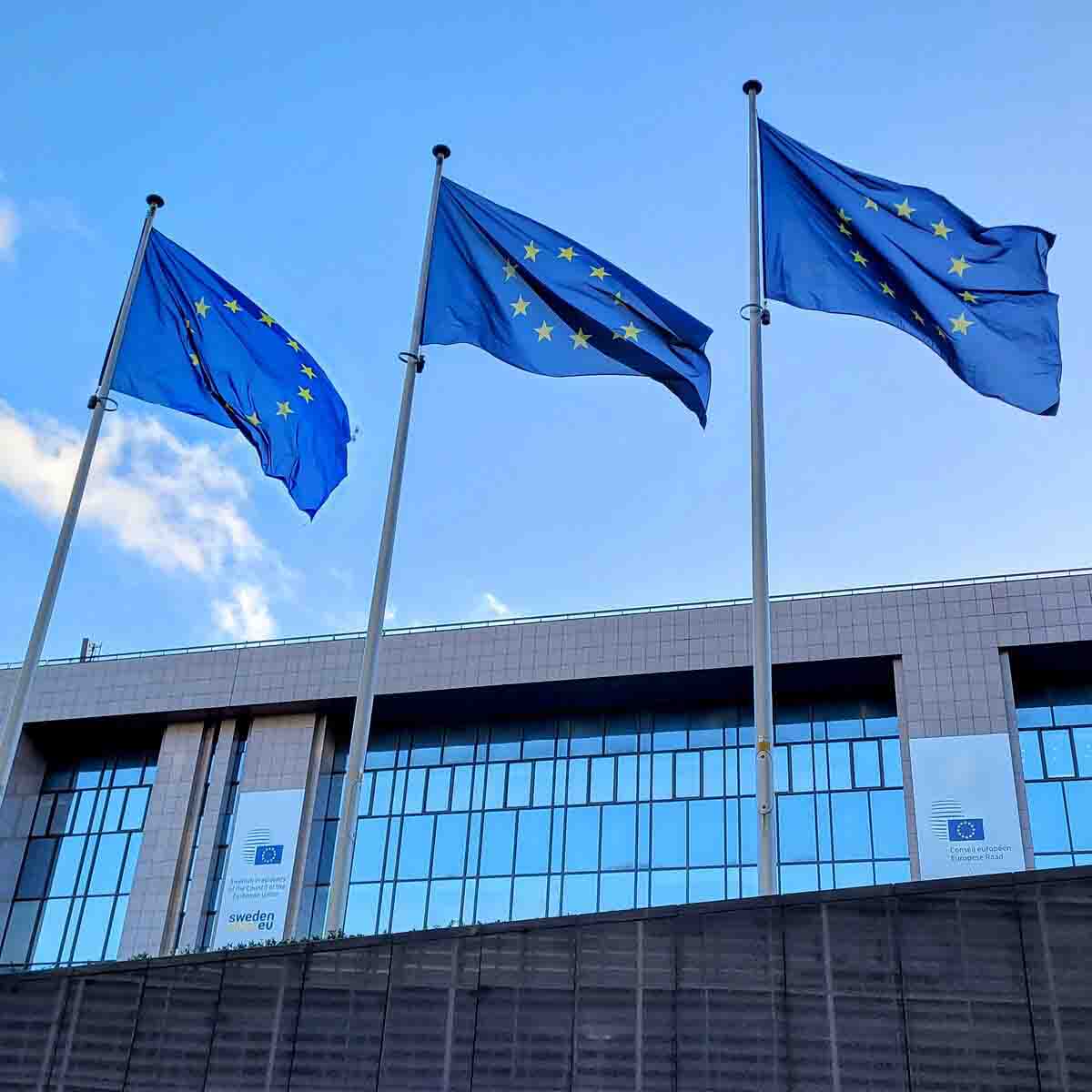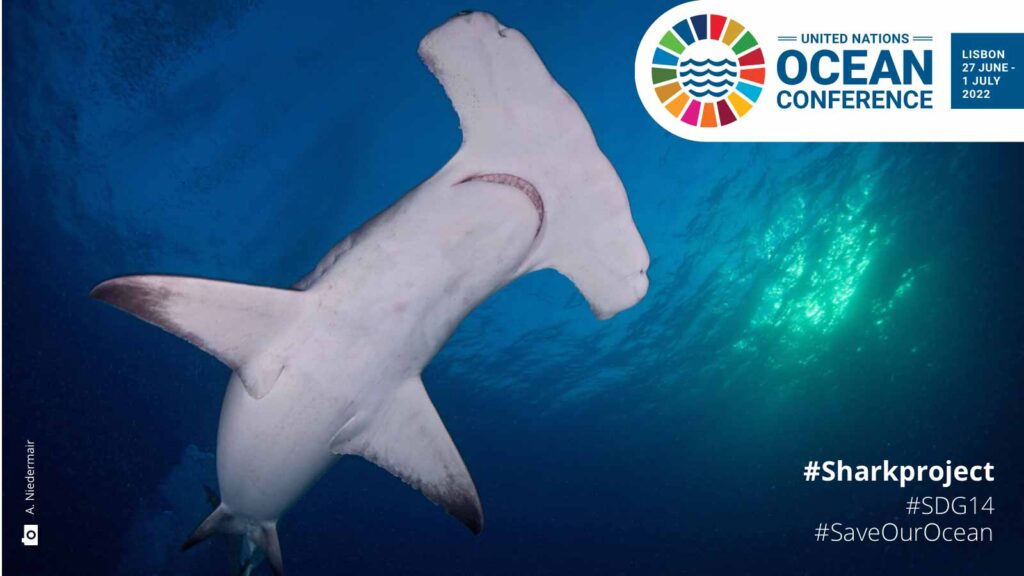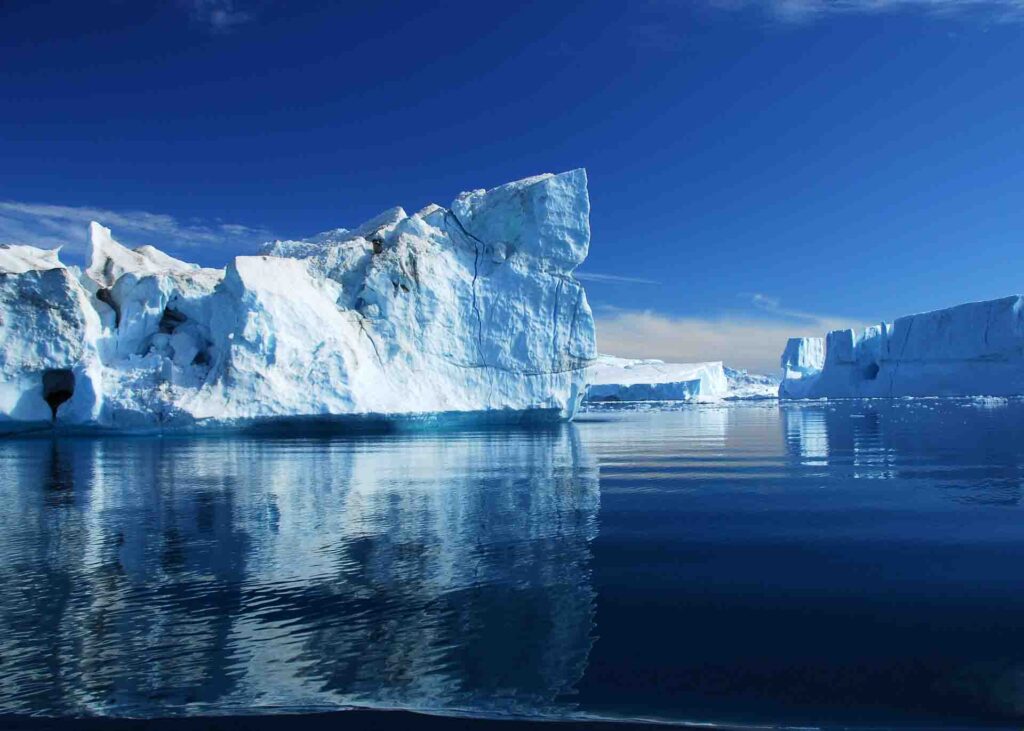
EU citizens calling to save sharks.
Will the EU follow the citizens' call? An analysis by SHARKPROJECT.
- EU citizens' initiative “Stop Finning EU” successful
- EU Parliament must act now
- A ban on the trade and transportation of shark fins is long overdue
Statement on the public hearing
On March 27, 2023, the public hearing of the citizens' initiative “Stop Finning – Stop The Trade” took place, in which more than 1.1 million EU citizens called for a ban on the loose fin trade in Europe. Dr. Iris Ziegler, Sharkproject Head of the International Cooperation Team, analyzes the public hearing in Brussels in detail.
Sharkproject has been actively campaigning against finning since 2004. The citizens' initiative was accompanied by an open letter signed by over 100 marine and animal welfare organizations.
We can summarize the main contents of the public hearing in 5 points:
- Successful EU citizens' initiative to end the trade in shark fins in the EU
- Global overfishing of shark populations due to the international shark fin trade
- Public hearing in the EU Parliament: EUROPÊCHE repeats false claims about sustainable shark fishing by EU fleets
- The political debate on the pros and cons of the ECI's call for a trade ban on fins
- Waiting for the Commission's response
Download the PDF with the detailed analysis by Dr. Iris Ziegler.
Successful EU Citizens' Initiative
In January, the EU Citizens' Initiative received 1.1 million votes from EU citizens in favor of a new regulation. This calls for loose shark fins to be naturally attached to the body of sharks (all shark and ray species are considered sharks) when they are imported into, transited through or exported from the European Union. EU citizens have thus urged the European Union to take action against the global threat to more than a third of all shark and ray species, which could become extinct within the next few decades.
The ban on finning at sea has several benefits for the protection of the animals. The main one is that the shark carcasses take up much more space in the cargo holds and therefore far fewer animals can be killed per trip. Furthermore, this is the only way to identify protected species without costly DNA analysis and thus ensure that species that are already highly endangered are not traded.
Some countries are already leading the way. Canada banned the import and export of detached shark fins back in 2019. In the United Kingdom, a bill has currently passed its second reading in the House of Lords. In December 2022, Austria unanimously decided to ban the import of all shark products. In the USA, a ban on the possession and trade of shark fins and shark fin products will soon follow.
Global overfishing of shark populations
The international trade in shark fins is fueling global overfishing of shark populations, to which EU fisheries contribute by targeting endangered shark species in national waters as well as in the high seas of the Atlantic, Indian and Pacific Oceans. Over 100 million sharks are killed by fisheries every year, often for the value of their fins, which end up as shark fin soup on Asian plates. And not only sharks, but also many ray species are sought after in the fin trade and are sold on the Asian markets at top prices of 1,000 dollars per kg. As a result of this massive overexploitation, more than a third of all shark and ray species worldwide are now threatened with extinction. At the last CITES Conference of the Parties (COP19), more than two thirds of countries therefore agreed to list around 90% of the shark species affected by the global shark fin trade and to subject them to the conditions of the Washington Convention on International Trade in Endangered Species of Wild Fauna and Flora from 2024.
Europêche repeats false claims
The successful citizens' initiative was assigned to the fisheries committee PECHE, which is apparently interested in preventing new legislation. As this would reduce the profits of the European shark fishing industry, the representatives always emphasized that shark fishing in the EU is the most sustainable in the world. Daniel Voces de Onaindi, Executive Director of Europeche, the political representation of EU fisheries in the PECHE Committee, stated several times that EU fleets condemn and have never practiced finning and that there has never been a violation or sanction in the EU in this context. This can be refuted several times (see PDF for details). According to him, the EU fleets do not catch any prohibited shark species – but he did not mention that only a few shark species are actually protected in EU waters and that the regulations of the various regional fisheries management organizations vary greatly. (See also the PDF for more details).
According to him, only two shark species (blue shark and shortfin mako) are fished by Spain, Portugal and France in the swordfish longline fishery. It is said that almost no shortfin mako is fished anymore. However, he did not mention that in Portugal and Spain, despite fishing bans, more than 1,000 tons of mako shark were fished for most of the year – unchanged from previous years. (further details in the PDF).
Furthermore, according to Europeche, the blue shark is supposedly the most widespread and fastest growing shark species and therefore not under threat. However, he is referring to studies that are almost 10 years old. According to Daniel Voces de Onaindi, the detached blue shark fins are very easy to distinguish from others. Maybe not for the inspectors, but for him…
According to Europêche, shark fins are fully traceable, as all EU fleets have had to land all sharks with naturally attached fins since 2013. However, only around 2% of the vessels landed in the EU are inspected. The EU vessels that land in non-EU ports are not checked at all. (more details in the PDF)
Daniel Voes de Onaindi claims that only 40-35% of the value of the shark trade comes from the fins, while 60-65% of the value comes from the meat, and that therefore shark fishing would not be profitable without the profits from the meat. However, as the fins only account for 5% of the weight and storage space in the holds is limited, the real calculation is quite different.
Finally, he pointed out that shark fishing is necessary for food security and a healthy and nutritious diet for the Europêche, which is rich in vitamins and prevents heart disease, and that “a ban is not a solution, not justified and not an option for our fishermen”. These claims clearly ignore the dangers to human health associated with eating sharks, as high levels of methylmercury and other contaminants accumulate in these long-lived top predators through the food web. (further details in PDF)
The political debate on the pros and cons
Dr. Silvia Earle, former NOAA Science Director and founder of Mission Blue, emphasized that a healthy ocean is needed by both sharks and humans, but depends on healthy shark populations.
Stefanie Brendl from Shark Allies also emphasized that the value of exporting shark fins for shark fin soup is the main reason for the massive killing of sharks by industrial fishing fleets, and compared the mass killing to taking red blood cells from the ocean: “If you take too many of them, the whole system suffers”.
Bradley Soule recounted his experience of 20 years of fisheries enforcement and shared that in that time he had never met an enforcement officer who believed that the current system of trade in severed fins was enforceable.
In the debate that followed, several concerned MEPs also expressed their concerns about Europêche’s presentation and supported the ECI motion, while some Spanish MEPs clearly supported the interests of Spanish shark fisheries and ignored the obvious.
Many MEPs thanked the initiators of the Citizens' Initiative and openly declared their support. Namely these were: Grace O’Sullivan (Greens, Ireland), Francisco Guerreiro (Greens, Portugal), Angela Danzi (Italy), Ska Keller (Greens, Germany), Manuela Ripa (Greens, Germany), Peter van Dalen (Christian Democrats, Netherlands), Peter Schmidt (President of the Section for Agriculture, Rural Development and the Environment of the European Economic and Social Committee) and Caroline Rose (Greens, France). What they said and more details about our speakers in the PDF.
Although not all members of the PECHE Committee were present at the hearing and only a few contributed their views in support of the Europêche position, overall their arguments sounded rather repetitive and overall weak in the face of the strong arguments put forward by the proponents. Ana Miranda (Greens, Spain, Vice-President of Peche), Clara Aguilera (Group of the Progressive Alliance of Socialists & Democrats in the European Parliament, Spain) and Francisco Milan Mon (Christian Democrats, Spain) contributed their views, which are also reflected in the PDF.
Waiting for the Commission’s response
Virginijus Sinkevičius, the EU Commissioner for Environment, Oceans and Fisheries, gave the last speech at the hearing but unfortunately missed most of the debate. He had therefore not heard the compelling arguments of the ECI and the strong support for a trade ban put forward by both experts and many Members of the EU Parliament when he emphasized that the EU must also live up to its obligations within the community of nations. However, he acknowledged that there were clearly gaps in reporting and enforcement of existing rules that needed to be addressed. However, he left open how the Commission would respond to the ECI’s call for a trade ban on fins.
He thanked the representatives of the ECI for launching this initiative. He announced that the Commission would announce its decision on how to proceed, as provided for in the ECI statutes, by the end of July.
Fisheries fearing for their profits may still not be ready to accept the scale of the global decline in shark stocks and the loss of biodiversity in our oceans. By now, even these fisheries should realize that it is only a matter of time before all shark populations are overfished and stocks collapse, with far greater negative impacts on all fisheries and the ability of marine ecosystems to provide food for this and future generations. However, as this will once again hit the global South first and hardest, the rich EU fishing companies seem to prefer to ignore the facts, the available science and the clear demand of 1.1 million EU citizens.
your contact person Thomas Gahr
We report on Shark protection stay informed!

Don’t miss any events, current projects, educational programs and news! Sign up for our free newsletter and stay up to date!























